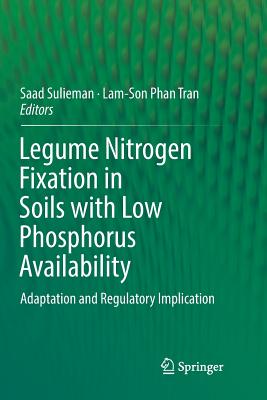Legume Nitrogen Fixation in Soils with Low Phosphorus Availability: Adaptation and Regulatory Implication
暫譯: 低磷可用性土壤中豆科植物氮固定:適應與調控意涵
Sulieman, Saad, Tran, Lam-Son Phan
相關主題
商品描述
The awareness of the rapidly rising world population must translate into a parallel increase in agricultural production in order to sustain the growing population both now and in the future. Hence, the demand for food crops to produce proteins and vegetable oil for human consumption is going to increase considerably during the coming years. The essential role of legumes in agriculture is well-recognized, given the abundant levels of proteins and oils found in plants along with their enormous contribution to the sustainability of agricultural systems and human health. The capacity of legumes to fix nitrogen (N2) in partnership with rhizobia provides an input-saving and resource-conserving alternative, thereby reducing the need for chemical fertilizers while enhancing overall crop productivity. The use of N2-fixing legumes to produce plant proteins results in a substantial decrease in the consumption of fossil fuels and therefore also in the agricultural effects to global warming. However, a major constraint to legume production is low soil phosphorus (P) availability, considering that an overwhelming majority of the world's soils are classified as P-deficient. Low-P availability is especially problematic for legumes, since legume nodules responsible for N2 fixation have a high P requirement. Therefore, this book explains how nodule N2 fixation responds to low P availability, which is crucial for improving legume production and maintaining agricultural sustainability in the context of the global P crisis.
商品描述(中文翻譯)
這本深思熟慮且引人深思的書籍提供了一個簡明且最新的介紹,說明當前及預測未來的磷資源短缺將如何影響豆類的生長及其共生固氮能力。這是一項及時的研究,探討了結節對磷缺乏的生理和分子反應,旨在識別共同原則。與作物生產力相關的多個學科的學生和研究人員將會發現這本書在植物壓力生理學領域中的重要貢獻。這本書中的知識也可以幫助植物育種者,特別是通過新的基因工程方法,開發具有更高共生效率的獨特和適應性品種。
對於迅速上升的全球人口的認識必須轉化為農業生產的平行增長,以維持當前及未來日益增長的人口。因此,未來幾年對於生產人類消費所需蛋白質和植物油的糧食作物的需求將會顯著增加。豆類在農業中的重要角色已得到廣泛認可,因為植物中含有豐富的蛋白質和油脂,並且對農業系統的可持續性和人類健康做出了巨大貢獻。豆類與根瘤菌合作固定氮氣(N2)的能力提供了一種節省投入和資源的替代方案,從而減少對化肥的需求,同時提高整體作物生產力。使用固氮豆類來生產植物蛋白質可顯著減少化石燃料的消耗,因而也減少了農業對全球暖化的影響。然而,豆類生產的一個主要限制是土壤中磷(P)的可用性低,因為世界上絕大多數土壤被分類為磷缺乏。低磷可用性對豆類特別成問題,因為負責固氮的豆類結節對磷的需求很高。因此,本書解釋了結節的N2固氮如何對低磷可用性作出反應,這對於改善豆類生產和維持農業可持續性在全球磷危機的背景下至關重要。
作者簡介
Dr. Lam-Son Phan Tran is Head of the Signaling Pathway Research Unit at RIKEN Center for Sustainable Resource Science, Japan. He obtained his M.Sc. in Biotechnology in 1994 and Ph.D. in Biological Sciences in 1997, from Szent Istvan University, Hungary. After doing his postdoctoral research at the National Food Research Institute (1999-2000) and the Nara Institute of Science and Technology of Japan (2001), in October 2001, he joined the Japan International Research Center for Agricultural Sciences to work on the functional analyses of transcription factors and osmosensors in Arabidopsis plants under environmental stresses. In August 2007, he moved to the University of Missouri-Columbia, USA as a Senior Research Scientist to coordinate a research team working to discover soybean genes to be used for genetic engineering of drought-tolerant soybean plants. His current research interests are elucidation of the roles of phytohormones and their interactions in abiotic stress responses, as well as translational genomics of legume crops with the aim to enhance crop productivity under adverse environmental conditions. He has published over 110 peer-reviewed papers with more than 80 research and 30 review articles, contributed 8 book chapters to various book editions published by Springer, Wiley-Blackwell, and American Society of Agronomy, Crop Science Society of America and Soil Science Society of America. He has also edited 7 book volumes for Springer, including this one.
Dr. Saad Sulieman graduated from the University of Khartoum in 1998 with distinction in Agronomy and was awarded many prizes for being the best graduate. He joined the Department of Agronomy, Faculty of Agriculture, University of Khartoum as a Teaching Assistant in 1999. Subsequently, he obtained a M.Sc. in Crop Sciences at the University of Khartoum (2002) and then a Ph.D. in Agricultural Chemistry (2009) at Georg-August University of Göttingen, Germany with a scholarship from the German Academic Exchange Service (DAAD). During his Ph.D. pursuit, he focused on investigating the physiological characterization of symbioses contrasting tolerance in nitrogen fixation to major soil limitations. After completing his Ph.D., he continued to work as a Research Assistant at the same institute for a year and a half. He also worked as a Postdoctoral Fellow at RIKEN Center for Sustainable Resource Science (CSRS), Yokohama, Japan for one year (2013) with a Postdoctoral Fellowship from the Japan Society for the Promotion of Science (JSPS). Recently, he has been awarded a Georg Forster Research Fellowship for experienced researchers from the Alexander von Humboldt (AvH) Foundation. Throughout his career, he has taught many students to the level of B.Sc. and M.Sc. Sulieman was promoted to Lecturer in 2005, Assistant Professor in 2009, and Associate Professor in 2013. Between 2014 and 2016, he held the position of Head of Department of Agronomy, University of Khartoum. Throughout the years of his research career, he has attended many domestic and international meetings, conferences, seminars and workshops. He has authored or co-authored more than 35 publications. The main focus of his research is the field of molecular plant physiology of abiotic stress.
作者簡介(中文翻譯)
陳林山博士是日本理化學研究所可持續資源科學中心的信號通路研究單位負責人。他於1994年獲得匈牙利聖伊什特萬大學的生物技術碩士學位,並於1997年獲得生物科學博士學位。在1999年至2000年間,他在國立食品研究所進行博士後研究,隨後於2001年在日本奈良科學技術大學繼續研究。2001年10月,他加入日本國際農業科學研究中心,研究在環境壓力下< i>阿拉伯芥< /i>植物中轉錄因子和滲透感應器的功能分析。2007年8月,他轉至美國密蘇里大學哥倫比亞分校擔任高級研究科學家,協調一個研究團隊,致力於發現大豆基因,以用於抗旱大豆植物的基因工程。他目前的研究興趣包括闡明植物激素在非生物壓力反應中的作用及其相互作用,以及豆類作物的轉譯基因組學,旨在提高作物在不利環境條件下的生產力。他已發表超過110篇同行評審的論文,其中包括80篇研究文章和30篇綜述文章,並為Springer、Wiley-Blackwell、美國農藝學會、作物科學學會和美國土壤科學學會的多個書籍版本貢獻了8章書籍。他還為Springer編輯了7本書籍,包括本書。
薩阿德·蘇利曼博士於1998年以優異成績畢業於喀土穆大學農藝學系,並因為是最佳畢業生而獲得多項獎項。他於1999年加入喀土穆大學農業學院農藝學系擔任教學助理。隨後,他在喀土穆大學獲得作物科學碩士學位(2002),並於德國哥廷根大學獲得農業化學博士學位(2009),該學位由德國學術交流服務(DAAD)提供獎學金。在攻讀博士學位期間,他專注於研究氮固定的共生生理特徵,對比耐受性與主要土壤限制的關係。完成博士學位後,他在同一機構繼續擔任研究助理一年半。他還於2013年在日本理化學研究所可持續資源科學中心(CSRS)擔任博士後研究員,並獲得日本學術振興會(JSPS)的博士後獎學金。最近,他獲得了亞歷山大·馮·洪堡基金會的喬治·福斯特研究獎學金,專為經驗豐富的研究人員設立。在他的職業生涯中,他教導了許多學生獲得學士和碩士學位。蘇利曼於2005年晉升為講師,2009年晉升為助理教授,2013年晉升為副教授。在2014年至2016年間,他擔任喀土穆大學農藝學系主任。在他的研究生涯中,他參加了許多國內外的會議、研討會和工作坊。他已發表或共同發表超過35篇出版物。他的研究主要集中在非生物壓力的分子植物生理學領域。











